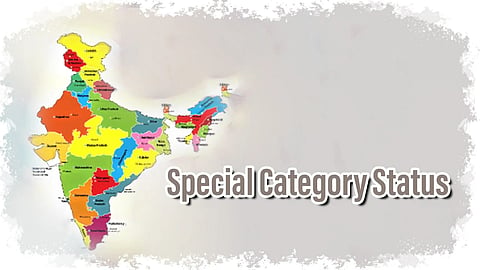

With the General Elections 2024 throwing up a fractured mandate, Nitish Kumar’s Janata Dal (United) and Chandrababu Naidu’s Telugu Desam Party (TDP) are set to play a key role in government formation at the Centre. As a result, their past demands for special category status (SCS) for Bihar and Andhra Pradesh, respectively, are back in focus.
Bihar has been asking for it ever since the mineral-rich Jharkhand was carved out of it back in 2000.
After its bifurcation in 2014, the then UPA government at the Centre had promised to grant SCS to AP to compensate for the loss of revenue and of Hyderabad, where much of the development was concentrated.
Special Category Status Vs Financial Package:
According to the 14th Finance Commission, the SCS was a burden on the Centre’s resources and this has been used by the central government to reject SCS to more states. In order to plug the resource gap without extending SCS, tax devolution to states has been raised to 42% as recommended by the 14th Finance Commission and has been maintained by the 15th FC (41%). However, with the 16th FC already set up and working on the formula for tax devolution between the Centre and states for the five-year period starting April 1, 2026. Now granting special category status to these two states may not be a simpler task. As Centre already indicated that Special Category Status for States is unviable; thus Centre have an option to release Financial Package for Bihar and Andhra Pradesh.
What is the Special Category Status?
Special category status is a classification of regions or states by the central government to provide special assistance in the form of tax benefits and financial support for development of the region. It was first introduced in 1969 based on the recommendations of the Fifth Finance Commission.
Criteria to Provide Special Status to a State:
Parameters (Based on Gadgil Formula):
Hilly and difficult terrain
Low population density and / or sizeable share of tribal population
Strategic location along the borders with neighboring countries
Economic and infrastructural backwardness and
Non-viable nature of state finances
Which States have Special Category Status?
In 1969, three states — Jammu & Kashmir (now a Union Territory after revocation of Article 370), Assam and Nagaland — were granted the special category status. Subsequently, 8 more states have been granted such a status. It includes Arunachal Pradesh, Manipur, Meghalaya, Mizoram, Sikkim, Tripura, Himachal Pradesh and Uttarakhand. Telangana was granted a special status tag after it was carved out of Andhra Pradesh in 2014 by the Manmohan Singh-led UPA government.
Benefits of Special Category Status?
States that come under special category status get preferential treatment in getting central assistance and tax breaks. For the implementation of the centrally-sponsored scheme, the special category status states are required to contribute just 10% while the central government provides 90% of the fund. For other states the centre provides 60%-70% of the fund. Allotted money if not spent, lapse for the normal states, but in the case of special category states it is carried forward. Special category states are provided tax breaks to attract investments. They are also given preferential treatment in allocation of central funds assistance.
States demanding SCS:
Several states have been demanding special category status. Bihar has been pitching for special category status since it was bifurcated in 2000. To press for its demand Nitish Kumar-led JDU along with other allies had organised rallies in Patna and New Delhi in 2012 and 2013. Political parties from Andhra Pradesh have hit the road with multiple protests since 2014 demanding special category status. Other states that have been pitching for a special category status are Jharkhand, Chhattisgarh and Odisha.
Demands for SCS in the Limelight Again:
Janata Dal (United) and Telugu Desam Party (TDP) and Jana Sena (JSP) are playing a key role in the Narendra Modi-led National Democratic Alliance (NDA) government at the Centre, as the BJP has failed to get absolute majority on its own. The TDP has won 16 seats, Jana Sena won 2 seats while the JDU 12 seats. TDP and JDU stood the second and the third largest constituents of the NDA after BJP. The TDP had quit the NDA in 2018 on the issue of special category status, but is likely to bring the issue back on the table. A senior JDU leader has already made clear that Bihar will press for the tag once again.
Why Andhra & Bihar Demanding SCS?:
Since its bifurcation in 2014, Andhra Pradesh has asked for a grant of SCS on the grounds of revenue loss due to Hyderabad going to Telangana. There is a need to encourage Andhra Pradesh to create comprehensive development plans that focus on sustainable growth, job creation, infrastructure development, and human capital enhancement.
Bihar faces significant economic challenges, including a lack of industrial development and limited investment opportunities. The bifurcation of the state resulted in the shifting of industries to Jharkhand, exacerbating the employment and economic growth issues in Bihar. The state grapples with natural calamities like floods in the northern region and severe droughts in the southern part.
Centre’s stand on demands of SCS:
Earlier Narendra Modi-led BJP government has made it clear multiple times that it will not consider the demands for special category status by any new state. Referring to the 14th Finance Commission’s opinion, Finance Minister Nirmala Sitharaman last year said that no more special category status would be given. The 14th Finance Commission (2015-20) recommended increasing the devolution of money to states from the divisible pool of central taxes to 42% from the earlier 32%. The 15th Finance Commission (2021-26) has also kept the tax devolution nearly at the same level. The Centre argues that higher tax devolution provides the states with more resources. Moreover, the concept of plan assistance is no more there as the Planning Commission has been scrapped.
